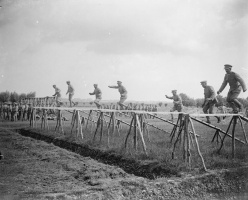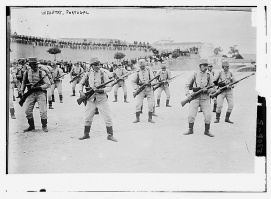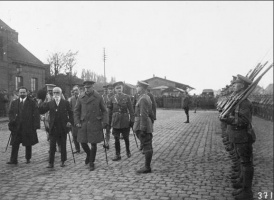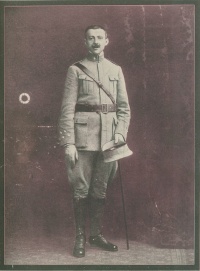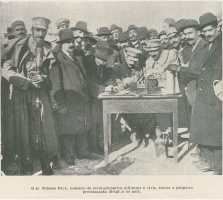Introduction↑
Weeks after the Bolshevik Revolution delivered the final blow to the Russian war effort, presaging the concentration of German effort in the West, another allied country, Portugal, saw its own war effort compromised by a violent uprising. Sidónio Pais (1872-1918) – mathematician, military reservist, former minister of finance and, most important of all, Portugal’s minister in Berlin until March 1916 – chose a particularly delicate moment to deliver a fatal blow with his small force, largely made up of very junior officers and even cadets. He correctly counted on the passivity of the troops stationed in Lisbon, awaiting their departure for France, and on the growing hostility of the population’s capital to the Sacred Union government, led by Afonso Costa (1871-1937). Pais also knew that once Lisbon had been secured, the rest of the country would quickly follow suit and acknowledge his authority.
But was this a revolution? Or merely a settling of scores among republicans, with Pais’s faction egged on, for the moment, by a vast array of forces that merely longed to see the humiliation of leading interventionist figures? Long a subject of academic interest among political scientists and historians alike, Sidónio Pais was the focus of a recent, extremely detailed biography by Armando Malheiro da Silva.[1] However, the debate surrounding his person and policies continues unabated.
Structural Difficulties Impeding Portugal’s War Effort↑
Interventionists Underestimate Their Task↑
It is clear that Portuguese interventionists underestimated the economic, social, and political impact of the First World War. The war’s successful prosecution demanded of all belligerents a level of popular consensus, leading to a willingness to endure sacrifice. The young republican regime, having antagonized much of the population before and after the decision to go to war, simply could not generate this willingness. The years 1910-1914 had been fraught with political strife between republicans and their monarchist rivals, but also among competing republican factions. Moreover, the republicans’ anticlericalism had resulted in strained relations with the Catholic Church, while their financial orthodoxy had dashed working-class hopes for social improvements once the new regime was in operation.
Moreover, it was also the case that the war, even as it mobilized millions of young men all over Europe, demanded a much greater intervention by the state and its agencies into the economic life of each country. This ensured maximum production and a fairest possible distribution of available resources (as well as an equality of sacrifice)[2]. This task too was beyond the technical competence of the Portuguese state. The two Sacred Union governments (1916-1917) saw their main goal as the military mobilization of expeditionary forces to Africa and France. This seems to have exhausted their human and material resources. As a result, attempts to prepare the country for the economic impact of war were disjointed, open to challenge, and ineffective. This led to mounting popular anger, quickly exploited by the governments’ – and the regime’s – enemies.[3] The consequences of this anger are explored in this article.
A Regime and a Country at Odds with Each Other↑
The Republic saw itself as a revolutionary regime. Led by a vanguard, it contained a nationalist cultural project that aimed at nothing less than the complete transformation of the Portuguese people, placing them at the forefront of the progressive nations. Fiscally and economically conservative, the Republic’s leadership believed it possible to bring about the modernization of Portugal through severe restrictions on the Church’s activities and improving access to education. There were forces to its left, in the shape of a Socialist Party and a trade-union movement, but these were still incipient and inchoate, representing little danger to the Republic. Their weakness was, in fact, a way of measuring the distance that separated Portugal from the industrialized powers of Europe, and therefore the scale of the task before the republican leadership.
Another measure of Portugal’s backwardness was the illiteracy rate, 70 percent of the population; still another was the high level of immigration to Brazil, not at all slowed by the regime change. Politically speaking, the bulk of the population was apathetic. The fall of the monarchy and its replacement by the Republic had been greeted with generalized indifference across the country. The new regime’s decision to limit the electorate to literate men over the age of twenty-one did little, if anything, to change this. Republican politics happened in a small setting, detached from the rest of the country but impinging on it from time to time. They were not always well received, as the growing conflict with the Church demonstrated. The war would affect this relationship, as can be expected, and the regime, whatever its leaders’ intentions, would suffer as a result.
Portuguese Intervention: Party Politics or National Necessity?↑
The people of Portugal were not consulted over the decision to go to war. The 1915 elections, handing total control of both houses of parliament to Costa’s Democratic Party, made war practically inevitable. The elections were marked by high abstention among an already limited electorate. News of the German declaration of war agitated politicized opinion, but left the rest of the country cold. This would soon change. Not only was wartime propaganda poor and insufficient, there soon developed a counter-propaganda that overwhelmed the Sacred Union government’s attempts to explain its actions. Rumours abounded that government ministers, among other crimes, were making a fortune selling soldiers to the Allies. Counter-propaganda took place in villages and cities, in barracks and schools, through word of mouth, graffiti, pamphlets and underground newspapers.
The restrictive nature of the Sacred Union, which precluded a working arrangement with the Catholic Church, made its predicament worse. As food became scarce due to lack of shipping and smuggling of existing stocks to Spain, and as prices rose, the scene was set for a number of challenges to the regime. In accordance with the practice of the time, most of these would be termed "revolutions". However, their aim was either to restore what might be termed a "moral economy", drowned in price increases, or to topple the Sacred Union government and pursue a different international policy.
1916-1917: Tension Mounts↑
The Machado Santos Coup, December 1916↑
The first of these challenges was carried out on 13 December 1916. This occurred after it became clear that the decision to send the Portuguese Expeditionary Corps (CEP) to France was irreversible, and that after a long and demoralizing wait, it had the Allies’ blessing. The coup was led by António Machado Santos (1875-1921). Machado Santos was a naval officer who had distinguished himself during the fighting on 4 October 1910 and been dubbed the "hero of the Rotunda" – the Lisbon roundabout where he had established his command post and from which monarchist forces had failed to dislodge him.[4] Machado Santos had ploughed a lonely furrow since then, resenting the prominent role assumed by politicians to the detriment of men of action such as himself. His dreams of a radical republic set aside, with few followers, and few readers of his newspaper O Intransigente, Machado Santos had turned to plotting against his erstwhile companions, without much success.
Deported to the Azores in 1915, Machado Santos devised another conspiracy the following year, hoping to capitalize on the growing estrangement between the army and the regime. His plot, overly reliant on a number of small but crucial details, fell apart quickly. This allowed many who had pledged their support but did not act when needed to walk away unscathed. The government’s response was swift, with Machado Santos and leading supporters arrested; seventy officers were directly implicated in the day’s events. It was then announced that new, draconian legislation would be applied retroactively in order to cover the 13 December leaders. This caused much unease among backbenchers, especially those of the Evolutionist Party, the junior partner in the Sacred Union coalition.[5] Echoes of the 13 December "revolution" were felt the following month, when a number of officers refused to obey orders to move with their units to Lisbon. The officers in question were arrested and sent under detention to France, where they rejoined their units.
Political Strife within the Sacred Union↑
1917 was a crucial year in Portugal, as in all other belligerents. It was the year in which the war’s unexpected duration put all governments and war efforts to the test, pushing them to their limit. The Portuguese government had hoped that peace would return to the country once the troops were at the front, fighting the German army. As War Minister José Maria Norton de Matos (1867-1955) informed a French military attaché in December 1916:
But this was merely wishful thinking on the government’s part. Its ability to control events across Portugal, to enforce its will and crucial wartime legislation, was slipping away. In April 1917, the first Sacred Union government fell. Its constituent parties were divided over the issue of consultation with social partners. Afonso Costa took over the reins of power, leading a cabinet wholly composed of Democratic Party ministers. This executive was of necessity weaker than its predecessor. The danger signs were everywhere: urban and rural food riots and assaults on warehouses, desertion networks that acted with the complicity of local authorities, the Fátima apparitions and the accompanying clerical mobilization, and ever more cutting propaganda. This propaganda alleged that republicans and their children were stationed safely behind the lines in France while those with no political connections, or belonging to rival factions, were exposed to constant danger in the trenches.
Social Unrest↑
In May 1917, a massive food riot in Lisbon led to the imposition of martial law and brutal intervention by the forces or order, leaving many dead. In July 1917 – while parliament met in secret session to discuss the reasons for, and the nature of, Portugal’s intervention in the conflict – a construction workers’ strike led to new wave of violence. What made this renewed bout more serious was that the suspension of constitutional guarantees concentrated power in the hands of the military governor of Lisbon, General António Pereira d’Eça (1852-1917). At that precise moment, he was being accused of being a war criminal in the secret sessions of parliament as a result of allegations made by a number of participants in the 1915 Angolan campaign.[7]
The situation in the capital reached a nadir in September 1917 when a the government responded to a postal workers’ strike by imprisoning the workforce aboard a liner anchored on the Tagus estuary and announcing its imminent military mobilization. This strike was especially damaging because the postal workers were generally seen as loyal republicans. Many had been given a job in the corporation because of their services to the regime. In response, the União Operária Nacional (OUN) declared a general strike which forced the cabinet to back down, having united much of the country against it. One postal worker wrote to a friend in the French army, in a letter intercepted by the postal censors:
Behind all of this agitation lay the calamitous supply situation of a country that could not feed itself and that did not have the necessary ships to secure its supply of essential foodstuffs and fuel, despite having gone to war after the seizure of a sizable merchant fleet. By November 1917, President Bernardino Machado (1851-1944) warned the French minister, Emile Daeschner (1863-1928), that the capital was facing a complete collapse in the supply of bread, with unforeseeable consequences. The diplomat informed Paris that there was little point in dispatching emergency supplies to Lisbon, given the inefficiency and corruption of the authorities charged with food distribution.[9]
Sidónio Pais in Power↑
Afonso Costa in Paris↑
Despite Daeschner’s opinion, Afonso Costa believed that salvation was at hand thanks to Allied help. On 18 November 1917, he left for Paris in order to attend an Inter-Allied conference designed to attend to the economic and financial difficulties of certain countries. The conference was delayed and the Portuguese premier had to spend an unusually long time away from Lisbon, during which time the domestic political climate soured considerably. Costa and his supporters would later claim that he had secured the restitution of 100,000 tons of German merchant shipping at this gathering. In addition, he was supposed to have secured all the coal necessary for the economic life of Portugal (half a million tons per year) and the wheat necessary to cover the existing deficit between production and consumption (240,000 tons per year) for the rest of the war "and until one year after the signing of the armistice, without immediate cost and to be reimbursed only after the end of the war".[10] The claim would also be made that Portugal had been designated a priority country for reparations. Whether or not these claims were true, or wild exaggerations, mattered little in the end. When Costa’s train entered Portugal, in the morning of 6 December 1917, word reached him that he should not continue to Lisbon, where a violent military revolt had broken out. He was diverted to Oporto, where he was arrested on the night of 7 December 1917 in a hotel.
Sidónio Pais’ Timing↑
What had happened? Norton de Matos, in charge of the country during Afonso Costa’s absence, had attempted unsuccessfully to organize the capital’s defence against a small military force. The French minister estimated that said force to be no stronger than 250 men at the start of the coup. However, it then grew to 1,500 men. Above all, however, the day was decided by the refusal of other military units stationed in Lisbon to act. This led Norton de Matos to present the cabinet’s resignation to President Machado. We have already seen that Afonso Costa was in Paris in the weeks that preceded the coup. During those weeks, speculation had been rife in Portugal that the new parliamentary session, due to start in December 1917, would see Afonso Costa’s cabinet replaced by a more representative government.
It is difficult to disassociate Sidónio Pais’ coup from this specific circumstance – a weakness at the heart of government obvious to all observers – as well as from the wider context of the war. The CEP was facing increasing difficulties in France due above all to the lack of shipping. Forces in Mozambique had just suffered an important defeat at Negomano, allowing the German troops under Paul von Lettow-Vorbeck (1870-1964) to escape their British pursuers into Portuguese territory, where they survived until September 1918. The coup could not but negatively affect the CEP’s morale. This meant that the moral standing of any government issued from it would be vulnerable. Given Portugal’s reliance on its allies for food and fuel, as well as protection from naval attack, the new government’s ability to pursue any different policy was limited.
A New Republic?↑
Supported among others by Machado Santos, who was quickly released from prison, Sidónio Pais set about building the New Republic. His followers depicted his action as a return to the lost purity of 5 October 1910, before the new regime had been sullied by the fight for power by the political parties. This purported to be nothing less than a resetting of the 1910 revolution on its original tracks, filtering out the demagogical influence that had spoiled it. The remnants of the "Old" Republic were discarded: President Bernardino Machado and his cabinet ministers were sent into exile, including Afonso Costa after a prolonged period behind bars without charges being pressed. The private residences of Costa and Norton de Matos were sacked and their private affairs recounted in the press. Parliament was closed, municipalities were dissolved and their elected officials were replaced by direct appointees.
The problem for Sidónio Pais, however, was that the attempt to keep the "old republicans" out of power necessarily entailed alliances with forces that did not share his vision, or, worse still, turning his back on the Republic’s democratic heritage. The truth, which quickly became apparent, was that the new president’s popularity, demonstrated when he travelled around the country and notably in the more conservative north, was on the right of the Portuguese political spectrum. However, such a popularity was not necessarily solid. Many on that same right were monarchists who saw him as a battering ram with which to defeat their own opponents before moving to a full restoration.
After castigating all political parties, Sidónio Pais decided to create a new one – the Partido Nacional Republicano (PNR). He hoped that all Portuguese "of good-will" might join it and contribute to the country’s salvation. They did not; instead, monarchists formed a parliamentary opposition. Sidónio Pais ran unchallenged for the presidency of the Republic, claiming a highly improbable half a million votes. He substantially reinforced that office’s powers, rebadging ministers as "secretaries of state", and toyed with corporativism in the Senate. His most dedicated supporters did not hesitate to turn to violence to enforce his wishes and he strengthened the powers of the police. Stanley Payne wrote that "one of the peculiarities of Portuguese political development has been a certain precocity in the introduction and consolidation of certain new political forms compared with some other countries of southern and eastern Europe".[11] There was certainly, with hindsight, more than a whiff of things to come across Europe in some aspects of the New Republic.
Sidónio Pais and the Army↑
A second-tier politician in the smallest of the three republican parties, Sidónio Pais found it hard to staff the country’s administration with loyal followers. He took advantage of the discontent within the armed forces – there were many cases of officers on leave from the Western Front who stayed in Portugal in some official capacity. This was one of the many phenomena which demonstrated Pais’ hostility to the interventionist programme, although he benefitted in this regard from British scepticism about the CEP’s military value. British military authorities came to the conclusion that the CEP should be removed from the frontlines – and this suited Pais’ policies perfectly.[12]
However, it proved impossible to carry out the CEP’s withdrawal as quickly as the British High Command desired. On the very eve of this movement, on 9 April 1918, Germany unleashed Operation Georgette, the second of its major spring offensives. The heaviest blow fell on the Portuguese forces, essentially destroying the CEP. Pais’ rhetoric praised the sacrifice of the Portuguese troops and suggested that through it Portugal had been redeemed. There was no question of reinforcing or rebuilding the CEP after 9 April 1918. Pais also made it a point to be present at the arrival of ships returning the wounded and ill to Portugal.
Lastly, Pais allowed the publication of reports into the various wartime African expeditions, especially those that revealed the level of political interference endured by the ill-fated 1916 Mozambique expedition. The latter expedition’s commanders had been pressured to invade German territory before there was nothing left to conquer. Newspapers supporting Pais took to calling former premier António José de Almeida (1866-1929) "the assassin of Newala" – Newala being the site of a major Portuguese defeat in Africa – as a result.
Difficulties Faced by the New Republic↑
Sidónio Pais did not lack popular support, at least as he consolidated his rule. However, this support was not unanimous or longlasting. Much has been written, for example, on his estrangement from the labour movement, which culminated in a general strike in November 1918, and on the increased militancy of the southern landless peasantry in the period.[13] But his stance on the war, his punishment and deliberate humiliation of Afonso Costa, and the revision of the law of separation between church and state won him many friends. As he toured the country, Pais was received as a liberator by enthusiastic crowds, making the mistake of confusing this popular goodwill with political strength. In Portugal, the two phenomena had rarely, if ever, coincided. It was this popular support that led him to create the PNR and to opt for an openly presidentialist path.
But it was not enough to save him, no matter how often Sidónio toured the poorest neighbourhoods of the capital, or how much money his "5 December Association" collected for charitable purposes. Whatever reforms his more radical collaborators introduced – including, at long last, taxes on war profits and the rationing of essential goods – were quickly swatted aside or ignored by the stronger mass of conservative support. Living conditions continued to deteriorate, and it became more and more obvious to those observing the situation in Portugal that the end of the Great War would spell the end of the regime. Given the proximity he always insisted on maintaining with the crowd, some began to think that the end of the war would also spell the end of his life – and they were right. A first assassination attempt took place on 8 December 1918; he was killed six days later at the Rossio train station in Lisbon.
Conclusion↑
Sidónio Pais’ New Republic, while "charismatic and populist", in Stanley Payne’s words, was driven by necessity, not original design, to adopt solutions redolent of the regimes that would soon proliferate across much of Europe. But it was hardly revolutionary. It was supported by some republicans who had fallen by the wayside since 1910, the army, large landowners, and the Catholic Church (thanks to a revision of the Law of Separation of Church and State). After some wavering, the trade-union movement came out against him and launched a revolutionary general strike, easily suppressed, once the war was over. In the final instance, Pais, out of necessity, became a bonapartist figure, a "strong man on horseback". He tried to square a circle, attempting to recast the Republic when most republicans stood against him and he had to rely on the regime’s enemies. The war provided his regime with the oxygen it needed to survive; once it was over, so too was the "New Republic".
Filipe Ribeiro de Meneses, National University of Ireland Maynooth
Section Editors: Maria Fernanda Rollo; Ana Paula Pires
Notes
- ↑ Malheiro da Silva, Armando: Sidónio e o Sidonismo [Sidónio and Sidonism], 2 volumes, Coimbra 2006.
- ↑ See: Horne, John N. (ed.): State, Society, and Mobilization in Europe During the First World War, Cambridge 1997.
- ↑ On the shortcomings of the Portuguese war effort, see: Ribeiro de Meneses, Filipe: Portugal 1914-1926. From the First World War to Military Dictatorship, Bristol 2004.
- ↑ On the Machado Santos coup, see: Afonso, Aniceto / Guerreiro, Marília: A Revolta de Tomar (13 de Dezembro de 1916) [The Tomar Revolt (13 December 1916)], in: Boletim do Arquivo Histórico Militar 51 (1981), pp. 67-196.
- ↑ Diário da Câmara dos Deputados (Lisbon) [Diary of Câmara dos Deputados], 18 December 1916.
- ↑ Ministère des Affaires Etrangères (Paris), Guerre 1914-1918, Portugal, Dossier Général, 634, Colonel Denvignes, military attaché in Madrid, to the Ministry of War.
- ↑ Ribeiro de Meneses, Filipe: Too Serious a Matter to be Left to the Generals? Parliament and the Army in Wartime Portugal, 1914-18, in: Journal of Contemporary History 33 (1998), pp. 85-96.
- ↑ Arquivo Histórico Militar (Lisbon), 1a Divisão, 35a Secção, Caixa 1298, letter to B. Gugliemi, Sapeur Télégraphiste – 8e Génie, Groupe D. Jarnac, France, 13 November 1917.
- ↑ Ministère des Affaires Etrangères (Paris), Guerre 1914-1918, Portugal, Dossier Général, 635, Telegram, Emile Daeschner to the MAE, 26 November 1917.
- ↑ de Abreu, José: O Mundo [The World], Lisbon, 30 May 1921.
- ↑ Payne, Stanley G.: Fascism and Right Authoritarianism in the Iberian World. The Last 20 Years, in: Journal of Contemporary History 21/2 (1986), pp. 163-77, 170.
- ↑ Portuguese-British contacts relating to the Portuguese Expeditionary Corps and its organisation during the Sacred Union and New Republic periods can be followed in: Portugal na Primeira Guerra Mundial, volume 2, As Negociações Diplomáticas e a Acção Militar na Europa e em África [Portugal in the First World War, volume 2, Diplomatic Negotiations and Military Action in Europe and in Africa], Lisbon 1995.
- ↑ On labour militancy during 1918 see: Samara, Maria Alice: Verdes e Vermelhos. Portugal e a Guerra no Ano de Sidónio Pais [The Green and the Red: Portugal and the War in the Year of Sidónio Pais], Lisbon 2003. An older treatment of the topic can be found in: Telo, António José: O Sidonismo e o Movimento Operário. Luta de Classes em Portugal, 1917-1919 [Sidonism and the Labour Movement: Class Struggle in Portugal, 1917-1919], Lisbon 1978.
Selected Bibliography
- Manuel Baiôa: Elites e Poder. A crise do Sistema Liberal em Portugal e Espanha, 1913-1931 (Elites and power. The crisis of the liberal system in Portugal and Spain, 1913-1931), Lisbon 2004: Edições Colibri.
- Medina, João: Morte e transfiguração de Sidónio Pais (The death and transfiguration of Sidónio Pais), Lisbon 1994: Edições Cosmos.
- Meneses, Filipe Ribeiro de: Sidónio Pais e o Sidonismo (Sidónio Pais and Sidonism), in: Amaral, Luciano (ed.): Outubro. A revolução republicana em Portugal, 1910-1926 (October. The Republican revolution in Portugal, 1910-1926), Lisbon 2011: Edições 70, pp. 227-256.
- Meneses, Filipe Ribeiro de: Portugal 1914-1926. From the First World War to military dictatorship, Bristol 2004: Hiplam.
- Meneses, Filipe Ribeiro de: Sidonio Pais, the Portuguese 'New Republic' and the challenge to liberalism in Southern Europe, in: European History Quarterly 28/1, 1998, pp. 109-130.
- O Treze de Dezembro. Homenagem a Machado Santos de um Grupo de Amigos (The thirteenth of December. Homage to Machado Santos by a group of friends), Lisbon 1917
- Payne, Stanley G.: Fascism and right authoritarianism in the Iberian World - the last twenty years, in: Journal of Contemporary History 21/2, 1986, pp. 163-177.
- Ramalho, Miguel Nunes: Sidónio Pais, diplomata e conspirador, 1912-1917 (Sidónio Pais, diplomat and conspirator, 1912-1917), Lisbon 1998: Edições Cosmos.
- Samara, Maria Alice: Verdes e vermelhos. Portugal e a guerra no ano de Sidónio Pais (Green and red. Portugal and the war in year of Sidónio Pais), Lisbon 2003: Editorial Notícias.
- Silva, Armando Malheiro da: Sidónio e Sidonismo (Sidónio and Sidonism), Coimbra 2006: Imprensa de Universidade.
- Tamagnini, Fernando, Marques, Isabel Pestana (ed.): Memórias do general, 1915-1919. 'Os meus três comandos' de Fernando Tamagnini (The general’s memoirs, 1915-1919. 'My Three Commands' by Fernando Tamagnini), Viseu 2004: Sacre.
- Telo, António José: O sidonismo e o movimento operário. Luta de classes em Portugal, 1917-1919 (Sidonism and the labour movement. Class struggle in Portugal, 1917-1919), Lisbon 1977: Distribuição, Ulmeiro.





